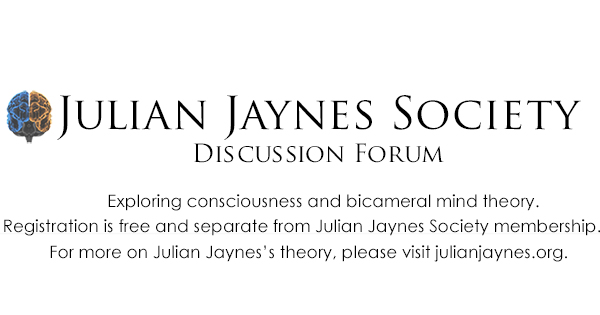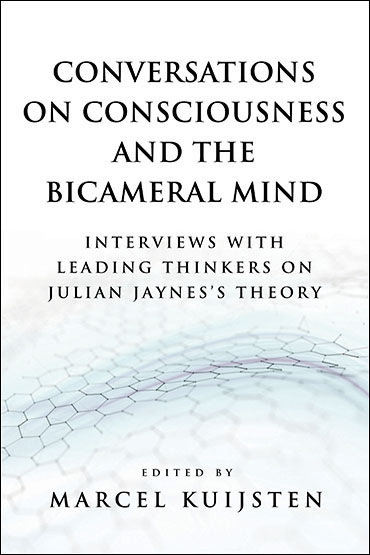I propose two diametrically-opposed perspectives on the nature of hallucinations. The first is the mainstream view held by most psychiatrists, mental health care providers, and researchers: Hallucinations signal brain disease or neurological dysfunction of some sort and are themselves pathological. Thus, being psychopathological, they demand bio-psychiatric treatment. Perceiving and believing something to exist that is objectively absent is a sign of a serious disorder whose symptoms require suppression or elimination, often by psychopharmacological means.
Adaptive Hallucinability
The second, more controversial approach, is inspired by Jaynesian psychology. It regards hallucinations as an important feature of bicamerality. “Hearing voices” originated as a side effect of language comprehension, an evolved mechanism for internal, psycholinguistic communication. The first hallucinations were probably self-to-self, i.e., one heard one’s own voice or perhaps that of a parent. Hallucinations are evolutionarily rooted in an innate superceptive capability, i.e., mentalizing well beyond what the immediate environment and perceptual field affords us. In preconscious times superceptions took the form of extraceptions (“hearing” externalized voices that were attributed to supernatural beings that governed behavior). Homo sapiens is endowed with a psychic architecture that provides us with adaptive hallucinability, and present-day hallucinations are a vestige of an earlier mentality.
By arguing that humans possess an innate hallucinatory ability (i.e., hallucinability) I am not suggesting that patients suffering from intrusive voices do not require treatment, i.e., there is no need to romanticize mental illness. Like other adaptations, hallucinations can go awry. The point is that hallucinations, though they may present as distressing symptoms that require intervention, are nevertheless not pathological in and of themselves.
Three types of evidence support the claim that hallucinations evolved as an adaptation. The first is how most hallucinatory experiences are nonclinical. Indeed, hallucinations are not uncommon and rarely diagnosable. Beginning in the 1980s the “hearing voices movement” and “hearing voice groups” (HVGs) have attempted to support those who experience hallucinations but are otherwise mentally and emotionally healthy by accepting and integrating voices into their lives. This is the mission of INTERVOICE (International Network for Training, Education and Reseaerch into Hearing Voices).
The second line of evidence concerns mental images; these are descendants of extraceptive experiences. In other words, mental imagery is an adaptation, a consciously interiorized form of hallucinability. Full-blown, preconscious hallucinations were avolitional, attributed to ancestors, gods, etc. (controlled by another), and were experienced “external” to the person. In contrast, introceptual cognitionwhat the mind’s eye witnessesis quasi-hallucinatory since it is volitional, attributed to the experient (controlled by self), and is believed to transpire “internally” (usually in the head or heart). Other hallucinoid experiences include dreaming; hypnagogia; hypnopompia; hallucinosis (hallucinations in otherwise normal states without confusion, disorientation, or psychosis; often associated with alcohol or substance use); and pseudo-hallucinations (what might be called “functional perceptual disorders”).
The third line of evidence supporting adaptive hallucinability is the most patently obvious. However, appreciating this reasoning demands a difficult defamiliarization since we must become acquainted with the extremely intense religiosity of the Bronze Age in which supernatural voices and visions played a ubiquitous and central role.
Humans Are Endowed with Hallucinability: “Hearing Voices” Is not Inherently Psychopathological
Posts by anthropologist, mental health counselor, and author Brian J. McVeigh on Julian Jaynes's theory and related topics.
Return to “Brian J. McVeigh's Random Thoughts”
Jump to
- JJS Forum
- ↳ General Discussion
- ↳ News Items Related to Jaynes's Theory
- ↳ Book Discussion: The Origin of Consciousness and Julian Jaynes Society Publications
- ↳ Myths, Misconceptions, and Fact Checks About Julian Jaynes's Theory
- ↳ Brian J. McVeigh's Random Thoughts
- ↳ Julian Jaynes
- ↳ Conferences, Events, and Local Discussion Groups
- ↳ Lecture Discussion
- ↳ Interview and Q&A Discussion
- ↳ 1.0. Hypothesis One: Consciousness Based On Language
- ↳ 1.01. Hypothesis One: Consciousness Based On Language | Subtopic: Consciousness & Dreams
- ↳ 1.02. Hypothesis One: Consciousness Based On Language | Subtopic: Consciousness in Children
- ↳ 1.03. Hypothesis One: Consciousness Based On Language | Subtopic: Consciousness and AI
- ↳ 2.0. Hypothesis Two: The Bicameral Mind
- ↳ 2.1. Hypothesis Two: The Bicameral Mind | Subtopic: Auditory Hallucinations in Normal Adults
- ↳ 2.2. Hypothesis Two: The Bicameral Mind | Subtopic: Hallucinations & Imaginary Companions in Children
- ↳ 2.3. Hypothesis Two: The Bicameral Mind | Subtopic: Hypnosis, Possession & Altered States of Consciousness
- ↳ 2.4. Hypothesis Two: The Bicameral Mind | Subtopic: Religion & the Bicameral Mind
- ↳ 2.5. Hypothesis Two: The Bicameral Mind | Subtopic: Schizophrenia
- ↳ 2.6. Hypothesis Two: The Bicameral Mind | Subtopic: The Mentality of Pre-Literate & Pre-Modern Peoples
- ↳ 3.0. Hypothesis Three: Dating the Development of Consciousness
- ↳ 4.0. Hypothesis Four: Jaynes's Neurological Model for the Bicameral Mind
- ↳ The Bicameral Mind in Fiction, Film & Popular Culture
- ↳ Information for Students


